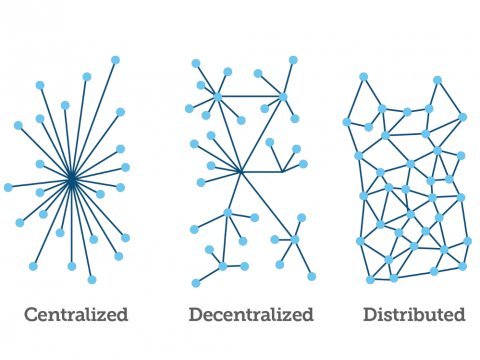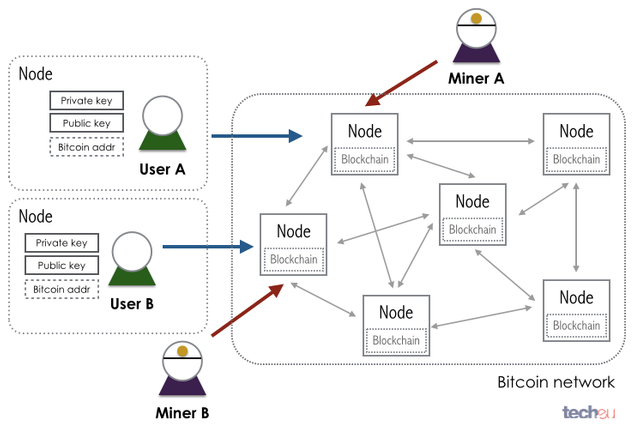The "Confused" Blockchain
Could this be why?

source
What's Hyping?
News articles about the adoption of blockchain technology (BCT) flooded the forums and websites lately. Big corporations announcing new partnerships and plans to improve their esteemed banking clients' current systems. Headlines such as "Wealth and Asset Management Report Predicts Blockchain Use by 2021" is one such example of the hot potato. It talks about blockchain industry is still in search for the best use cases for a mainstream adoption, and that BCT has garnered plenty of interest among many visionary industries/ companies, particularly the financial services companies (FSC).
What is in the not-so-distant future?
A large number of companies from various industries wants their hands on a slice of profit-churning technological pie, and yes, especially those companies with deep pockets. These are some examples of the industries/ companies which have made news:
Automobile Industry- Visa and DocuSign.
Banking and Financial Industry- Bank of America Merrill Lynch and Microsoft, Bank of Tokyo-Mitsubishi UFJ and IBM etc.
Cybersecurity Industry/ Cloud Management Industry- WISeKey/ Rubix by Deloitte, IBM Bluemix and Microsoft Azure etc.
Digital Healthcare Industry/ Digital Music Industry- Philips Healthcare and Tierion/ UJOMucis
Energy Industry
Forecasting Industry
Gaming Industry...
And the list continues to grow...
While some of these "disruptions" benefit end consumers directly (for example, UJOMusic, which is akin to Steemit's way of working), the others directly benefit the corporation, hence may indirectly benefit the end consumers.
Public versus Private, Is It Important?
Decentralized blockchain (DBC) is undeniably an amazing invention. It was invented to play the supporting role for BTC and BTC is a huge success due to it. Technological Giant (TG) "borrowed" the idea from BTC's blockchain to reinvent their own version of ‘private blockchains’ (PBC). There are varying schools of thoughts regarding PBC, some cynical and others forward-looking, and there haven't been a winner between public and private, perhaps there shouldn't be a winner, as their goals and usage are entirely different.
DBC is an open public ledger for anyone (or nodes) to audit and verify transactions, this is achievable due to its decentralized design. On the other hand, PBC allows for the adding and preventing users' (or nodes) access to the privileged group of people to audit and verify transactions, provides enhanced privacy and customization for business use, due to the distributed design.

source
In contrast with DBC's ability to prevent alterations to its entries, PBC could offer a varying degree of flexibility in customization- the ability to and/or prevention of modifications to selected entries etc.
The participants that attribute to BC's past and future success:
(users includes merchants and exchanges etc)

source
PBC is an entirely different ballgame. It can be customized to suit different use and the need for market participants vary.
For instance, the implementation of PBC in the area of payment services between service providers and end consumers will only make sense when there are as many market participants as possible. Market participants similar to the existing VISA's retail payments network is one good example. Another instance, the implementation of PBC in the area of trade clearance processes between inter-departments will make sense no matter how little participants there are- so long as the involved participants are added to it. Henceforth, PBC may not turn out to be , aforesaid, just another database.
Overhyped? Here are some thoughts to ponder on.
1
It is only the early stage of TG's acquisitions of clients and counterparts to act on the adoption, the hype feels like deja vu of the Internet introduction phase. But unlike the Internet decades ago, BCT is not exactly a new invention. It is more of a remaking of existing technologies such as P2P (e.g. Skype), cryptography (e.g. SSL), decentralized (e.g. Usenet) and/or distributed (e.g. Tor) network for consensus etc. (*note: 'Decentralized' system is a subset of a 'Distributed' system, but often loosely used interchangeably)
2
The keen parties who embraces new technologies are almost always the ones at the forefront seeking and trying out new innovations and implementations. Loosely speaking, the second waves of joiners, usually act upon seeing results from the Pioneers. Then followed by the third, who waits for hiccups( if any), to resolve before acting. And now, having seen the market movers and shakers on their way to future, the rest are pretty much left with no choice but to join in or to ends up losing the potential benefits/ customers the adopters are getting.
The recent buzz feels somewhat like a subtle yet forceful persuasion directing at the undecided potential market participants to leverage on the BCT. After much capitals injected into research, it is understandable that the pressure is on (especially for the TG) for aggressive marketing and acquisitions. Constant market buzzing will likely to create a kind of psychological industry pressure to the uncertain FSC- Remember, some areas of implementations i.e. payment services/ remittances services would be a success only when the technology is widely adopted.

source
3
Everyone uses the public Internet- From governments to corporations to commoners. Thankfully the Internet cannot be shut down otherwise it would be unimaginable to consume the inconvenience without it.
Generally speaking, the Internet is susceptible to hacking because it is a public network where users can leave their footprints behind and open up some backdoors (encryption is also not mandatory or foolproof). Like the Internet, the BC cannot shut down. But this does not mean that the private keys to BTC stored on computers cannot be stolen via hacking. The only way to remove yourself from risks of hacking is to have your BTC offline and disconnect from the Internet.

source: debakkoreans.wordpress.com
Since removing access to the Internet is not a viable option in today's world, for governments to corporations to commoners. PBC can act the role of the 'private internet' with 'private nodes' on a private network entirely seclude itself from the public Internet.
Where securities are concerned, it is undoubtedly a good practice to implementation a far more secure environment to remove the risk of leaked processes, data, and unfair advantages in exploitations. But of course, there is yet another saying for this and beyond the scope here.
Finally
PBC can be view as just a database for recording, an intranet of the Internet, the network of market participants for transactions, a new kind of 'Ethereum Blockchain', or a 'private Internet'. It is also said to be the means to restructure society- governments, banks, and even other corporations in a profound way. In fact, it can even possibly be everything all at once.
PBC can be known as the most advanced invention that will disrupt many industries or merely a 'pick and match' of existing technologies being repackaged; can be justified as a 'hype' or a proven formula; can be regarded as a better version of BTC's BCT or to have lost its value by means of privatization. In fact, this debate is perhaps one of the resultants of the open-source initiative- liberty to anyone who appreciates and wishes to use or improvise to what was shared, and Steemit is one example of improvising what's existing.
Whether it is the case of a confused blockchain or blockchain confusing people, part of blockchain technology is in mainstream positive limelight and edge of mainstream implementation but BTC would not be, not now, possibly never. And that's another topic for next time.


Knowing that no one pleases everyone and there is a flip side to every coin, including Bitcoin. Whether you agree, agree to disagree, or the opposite, do not just take my words for it, be sure to look it up.

All well known arguments, though yes, private blockchains are "just another database", because distributed databases have also been around for already 20 years at least, e.g. the Paxos algorithm.
The crux of the matter we long-time bitcoiners are mostly talking about is the question Why now? Banks and corporations did not seem much motivated to innovate like that for the last decades. They ought to feel some pressure now, don't they? Pressure from this shady internet drug money thing they don't dare to mention because it in turn questions everything they build their foundations on. And this is the point.
Agree. To top that, modern cryptography, Tor, and also many others were either the inventions stemmed from initiations of government bodies or deployed for secure communication/secret services use. Only due to the Internet boom did these inventions became widespread. So to say, the new technology such as BTC which sits on the developments of the above mentioned, can ultimately be traced back to the long debated World War to Cyberwar, the war on drugs to Silk Road etc...
Perhaps this is yet another way of looking at it too~
=)
Great post with good explanations!!!
Thanks for your compliments~